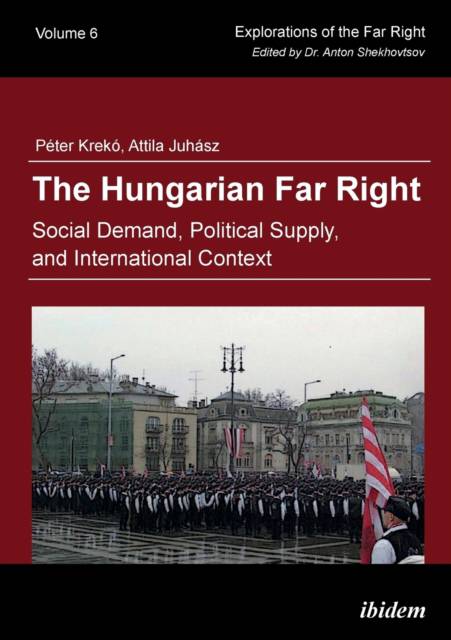
- Afhalen na 1 uur in een winkel met voorraad
- Gratis thuislevering in België vanaf € 30
- Ruim aanbod met 7 miljoen producten
- Afhalen na 1 uur in een winkel met voorraad
- Gratis thuislevering in België vanaf € 30
- Ruim aanbod met 7 miljoen producten
Zoeken
The Hungarian Far Right
Social Demand, Political Supply, and International Context
Péter Krekó, Attila Juhász
€ 36,95
+ 73 punten
Omschrijving
This timely book examines far-right politics in Hungary-but its relevance points much beyond Hungary. With its two main players, the radical right Jobbik and populist right Fidesz, it is an essentially Eastern European, European, and global phenomenon. Jobbik and Fidesz, political parties with a populist, nativist, authoritarian approach, Eastern and pro-Russian orientation, and strong anti-Western stance, are on the one hand products of the problematic transformation period that is typical for post-communist countries. But they are products of a "populist Zeitgeist" in the West as well, with declining trust in representative democratic and supranational institutions, politicians, experts, and the mainstream media. The rise of politicians such as Nigel Farage in the UK, Marine Le Pen in France, Norbert Hofer in Austria, and, most notably, Donald Trump in the US are clear indications of this trend. In this book, the story of Jobbik (and Fidesz), contemporary players of the Hungarian radical right scene, are not treated as separate case studies, but as representatives of broader international political trends. Far-right parties such as Jobbik (and increasingly Fidesz) are not pathologic and extraordinary, but exaggerated, seemingly pathological manifestations of normal, mainstream politics. The radical right is not the opposite and denial of the mainstream, but the sharp caricature of the changing national, and often international mainstream.
Specificaties
Betrokkenen
- Auteur(s):
- Uitgeverij:
Inhoud
- Aantal bladzijden:
- 268
- Taal:
- Engels
- Reeks:
- Reeksnummer:
- nr. 6
Eigenschappen
- Productcode (EAN):
- 9783838210742
- Verschijningsdatum:
- 30/10/2017
- Uitvoering:
- Paperback
- Afmetingen:
- 148 mm x 211 mm
- Gewicht:
- 350 g

Alleen bij Standaard Boekhandel
+ 73 punten op je klantenkaart van Standaard Boekhandel
Beoordelingen
We publiceren alleen reviews die voldoen aan de voorwaarden voor reviews. Bekijk onze voorwaarden voor reviews.











